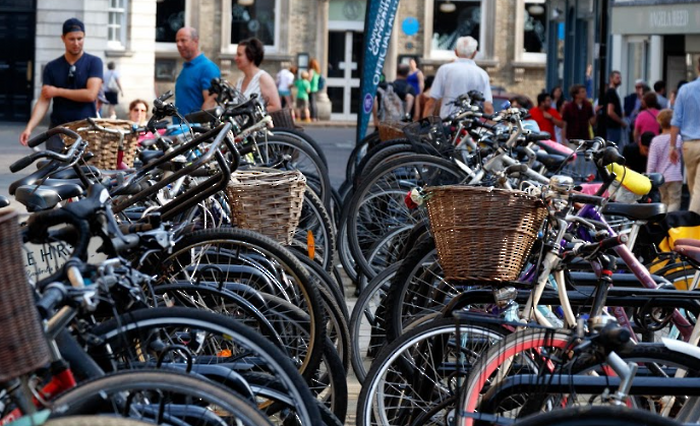Report reveals British social mobility has been stagnant since 2014. Cambridge must actively combat this injustice
Belle George argues that in order to tackle societal inequality universities must do more to offer places to students from less privileged backgrounds and Cambridge must take the lead.

Last month the Social Mobility Commission published the sixth annual State of the Nation report on Social Mobility in the United Kingdom. The report defines social mobility as “ensuring that a person’s occupation and income are not tied to where they started in life.” The results were dismal: social mobility has remained virtually stagnant since 2014. Evidently, the UK is a deeply unequal society wherein your circumstances of birth can largely dictate the rest of your life.
The report identified that children of parents in professional jobs are 80% more likely to get into a professional job than their less privileged peers. It also quantified the class pay gap, highlighting how those from working class backgrounds earn 24% less a year than those from professional backgrounds, predominantly due to the limited jobs they can access. It’s simple, and it’s sad: being born to privileged parents means you’ll probably live a privileged life. If not, it will be difficult to change your circumstances, and - ultimately - those of your children.
"It’s simple, and it’s sad: being born to privileged parents means you’ll probably live a privileged life"
Something can be done, however, to alleviate the current stagnation in social mobility. The report identifies key areas where changes can be made to help disadvantaged people fulfil their potential, including an extension in the eligibility criteria for receiving 30 hours weekly childcare, a new student premium for disadvantaged young people, and the Government setting an example by paying the voluntary living wage to all its staff and contractors. These demands are bold, but undoubtedly necessary. Leaders in education, politics and employment need to take conscious steps to ensure that everyone has equal access to opportunities. This includes Cambridge.
Esteemed academic institutions must definitively reject the principles of exclusion and privilege on which they were founded. Universities are key institutions in facilitating social mobility because the financial returns from a degree are still significant. On average, graduates from the 24 Russell Group universities earn 40% more than those who study at other universities. Access efforts to diversify these Russell institutions are indispensable considering the opportunity for social mobility they can provide.
It’s true that the Cambridge student body has diversified due to increased access efforts in recent decades, but for our university to truly become a driver for social mobility it must do more to offer places to students from less privileged backgrounds.
"Graduates from the 24 Russell Group universities earn 40% more than those who study at other universities. Access efforts to diversify these Russell institutions are indispensable"
That being said, the potential for social mobility of a Russell degree is not the sole reason we must work to improve access to esteemed universities. Living and studying with peers from a range of backgrounds can serve to heighten awareness of class inequalities and issues of social mobility. There is a current disparity between working class and middle class people’s views about whether class background gives advantages in life, as highlighted in the Social Mobility Commission’s report on public attitudes to social mobility. 85% of working class respondents thought there was a large gap between social classes in Britain today in comparison to 72% of middle class respondents. The difference in awareness of social inequalities by the privileged in British society is likely impeding social mobility, because these groups hold much of the power. We need politicians, business owners and university leaders to be conscious of how inequalities are being reproduced generation on generation, and actively work to ensure everyone has equal access to all opportunities.
Diversifying esteemed universities like Cambridge can evoke awareness of the lived experiences of the less advantaged in privileged students who, prior to university, grew up in relatively homogenous - namely privileged - environments. We need the future generations of leaders, many of whom will no doubt be Cambridge graduates from relatively affluent backgrounds, to be more conscious of the differences in opportunity social background currently creates. When Theresa May entered Downing Street in 2016, she promised to tackle the “burning injustice” of social inequality. The recent Social Mobility Report reveals the failure of her government to combat this inequity. We need leaders to make their rhetoric about social mobility into a reality, actively working to combat inequalities of birth.
Without a heightened awareness of deep class disparities, change cannot occur. As it stands, there is an ignorance regarding the advantage afforded by class background amongst some middle class students in Cambridge. The old maxim that ‘the fish will be the last creature to discover water’ comes to mind, namely because it is difficult to be aware of something when you are immersed in it. If we are to make our generation a transformative one, future leaders need to have lived and learned with people from all walks of life if they are to make real change to Britain’s stagnant social mobility.
 News / Cambridge bus strikes continue into new year16 January 2026
News / Cambridge bus strikes continue into new year16 January 2026 News / Uni members slam ‘totalitarian’ recommendation to stop vet course 15 January 2026
News / Uni members slam ‘totalitarian’ recommendation to stop vet course 15 January 2026 Science / Why smart students keep failing to quit smoking15 January 2026
Science / Why smart students keep failing to quit smoking15 January 2026 Interviews / The Cambridge Cupid: what’s the secret to a great date?14 January 2026
Interviews / The Cambridge Cupid: what’s the secret to a great date?14 January 2026 Comment / Will the town and gown divide ever truly be resolved?12 January 2026
Comment / Will the town and gown divide ever truly be resolved?12 January 2026









